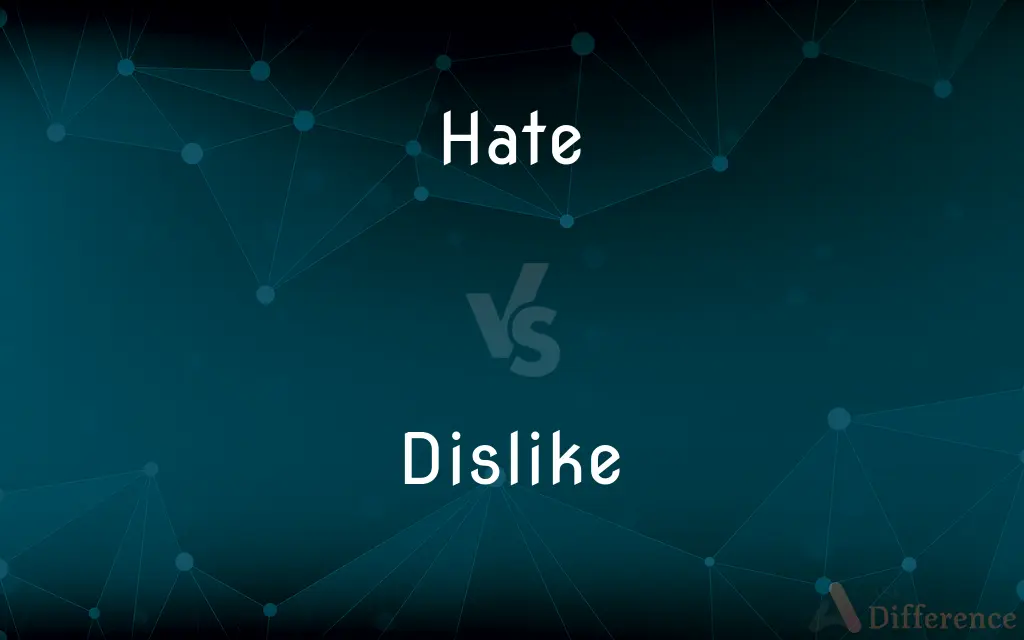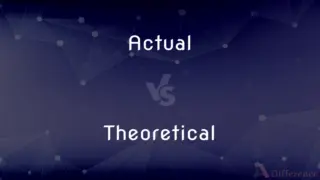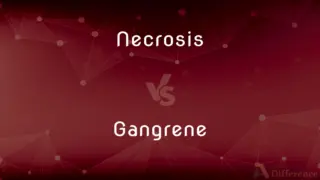Hate vs. Dislike — What's the Difference?
By Tayyaba Rehman — Updated on September 23, 2023
Hate is an intense aversion often driven by anger or hostility, while Dislike is a milder form of aversion or unfavorable feeling towards something.

Difference Between Hate and Dislike
Table of Contents
ADVERTISEMENT
Key Differences
Hate and Dislike are terms that express negative emotions toward something, but they vary in their degree of intensity. Hate is a powerful emotion characterized by strong aversion, often accompanied by anger or hostility. It's an emotion that can consume a person and often leads to harmful actions or thoughts.
On the other hand, Dislike represents a milder form of aversion. It signifies a less passionate negative feeling toward something. When someone says they Dislike a particular food, it simply means they don't enjoy its taste, but saying they Hate it suggests a deeper, more intense aversion.
Both Hate and Dislike can be directed towards people, places, ideas, or things. For example, one might Hate injustice but merely Dislike a specific policy. It's worth noting that Hate often carries more moral and ethical implications, while Dislike is more of a personal preference.
From a linguistic perspective, both Hate and Dislike can be used as nouns and verbs. However, Hate usually conveys a stronger emotional charge, and its use can sometimes be hyperbolic, intensifying the sentiment beyond its actual feeling. Dislike, being milder, is often used to describe personal preferences without necessarily invoking strong emotions.
Comparison Chart
Definition
Intense aversion often with anger or hostility
Milder form of aversion
ADVERTISEMENT
Intensity
Strong emotion
Less intense emotion
Usage
Often moral or ethical implications
Generally personal preferences
Linguistic Role
Can be used as both noun and verb
Can be used as both noun and verb
Examples
Hate crimes, hating injustice
Disliking a song, disliking a particular food
Compare with Definitions
Hate
Profound animosity or hostility.
Wars often stem from deep-rooted Hate.
Dislike
A mild aversion to something or someone.
I Dislike waking up early in the morning.
Hate
Loathing or detesting something.
He has a pure Hate for betrayal.
Dislike
Absence of preference or fondness.
I Dislike attending long meetings.
Hate
An extreme distaste or dissatisfaction.
I Hate it when plans get canceled at the last minute.
Dislike
Feeling of disapproval or displeasure.
He took an immediate Dislike to the new policy.
Hate
An intense aversion driven by strong emotion.
He began to Hate the very sight of injustice.
Dislike
A personal preference against something.
It's not that the movie was bad; I just Dislike horror genres.
Hate
To feel strong dislike for or hostility toward
Rivals who hate each other.
Dislike
Feeling of distaste or lack of favor.
Many kids Dislike broccoli.
Hate
To feel dislike or distaste for
Hates washing dishes.
Hates to get up early.
Dislike
To regard with distaste or aversion.
Hate
To be disinclined (to do something) out of politeness or a need to apologize
I hate to interrupt, but can I ask you a quick question?.
Dislike
An attitude or a feeling of distaste or aversion.
Hate
To feel hatred.
Dislike
An attitude or a feeling of distaste or aversion.
Hate
Intense animosity or dislike; hatred.
Dislike
Something that a person dislikes (has or feels aversion to).
Tell me your likes and dislikes.
Hate
An object of hatred.
One of my pet hates is traffic wardens.
Dislike
(Internet) An individual vote showing disapproval of, or lack of support for, something posted on the Internet.
Hate
Hatred.
He gave me a look filled with pure hate.
Dislike
To displease; to offend. In third-person only.
Hate
(Internet slang) Negative feedback, abusive behaviour.
There was a lot of hate in the comments on my vlog about Justin Bieber from his fans.
Dislike
(transitive) To have a feeling of aversion or antipathy towards; not to like.
Hate
(transitive) To dislike intensely or greatly.
Dislike
(Internet) To leave a vote to show disapproval of, or lack of support for, something posted on the Internet.
Rebecca Black's "Friday" video has gained notoriety for being one of the most disliked videos in YouTube history.
Hate
(intransitive) To experience hatred.
Do not fear; he who fears hates; he who hates kills. — attributed to Gandhi
Dislike
To regard with dislike or aversion; to disapprove; to disrelish.
Every nation dislikes an impost.
Hate
To have a great aversion to, with a strong desire that evil should befall the person toward whom the feeling is directed; to dislike intensely; to detest; as, to hate one's enemies; to hate hypocrisy.
Whosoever hateth his brother is a murderer.
Dislike
To awaken dislike in; to displease.
Hate
To be very unwilling; followed by an infinitive, or a substantive clause with that; as, to hate to get into debt; to hate that anything should be wasted.
I hate that he should linger here.
Dislike
A feeling of positive and usually permanent aversion to something unpleasant, uncongenial, or offensive; disapprobation; repugnance; displeasure; disfavor; - the opposite of liking or fondness.
God's grace . . . gives him continual dislike to sin.
The hint malevolent, the look oblique,The obvious satire, or implied dislike.
We have spoken of the dislike of these excellent women for Sheridan and Fox.
His dislike of a particular kind of sensational stories.
Hate
To love less, relatively.
Dislike
Discord; dissension.
Hate
Strong aversion coupled with desire that evil should befall the person toward whom the feeling is directed; as exercised toward things, intense dislike; hatred; detestation; - opposed to love.
For in a wink the false love turns to hate.
Dislike
An inclination to withhold approval from some person or group
Hate
The emotion of hate; a feeling of dislike so strong that it demands action
Dislike
A feeling of aversion or antipathy;
My dislike of him was instinctive
Hate
Dislike intensely; feel antipathy or aversion towards;
I hate Mexican food
She detests politicians
Dislike
Have or feel a dislike or distaste for;
I really dislike this salesman
Hate
A strong emotion opposing someone or something.
She couldn't understand the Hate she felt from the stranger.
Common Curiosities
Can Dislike escalate to Hate?
Yes, prolonged or intensified Dislike can potentially escalate to Hate.
Are Hate crimes and Dislike crimes the same?
No, Hate crimes are driven by strong aversion and prejudice, whereas Dislike doesn't usually lead to criminal acts.
Why do people often say "hate" for mild dislikes?
People sometimes use "hate" hyperbolically to emphasize their Dislike.
Are Hate and Dislike interchangeable?
No, Hate is much stronger than Dislike, expressing intense aversion.
Can Dislike be based on misunderstandings?
Yes, sometimes Dislike arises from misconceptions or lack of knowledge.
Is it natural to Dislike things?
Yes, Dislike often represents personal preferences and can be natural.
Can you Hate an action but not a person?
Yes, it's possible to Hate someone's behavior without hating the individual.
Is Hate a universal emotion?
Hate, as a strong aversion, is felt across cultures, but its manifestations and triggers can vary.
Can Dislike be constructive?
Yes, expressing Dislike can lead to discussions and improvements.
Is Hate always negative?
Generally, yes. Hate is a strong negative emotion.
How can one manage Dislike?
Open communication and seeking understanding can help manage Dislike.
Why is Hate seen as a powerful emotion?
Because it can drive significant actions and reactions, often leading to conflicts.
Can animals experience Hate and Dislike?
While animals can show aversion (akin to Dislike), it's debated if they experience Hate in the human sense.
How can one differentiate between Hate and strong Dislike?
By analyzing the intensity, consistency, and impact of the emotion on thoughts and actions.
Is it wrong to Dislike something?
Dislike is a natural emotion, and it's okay as long as it doesn't lead to harm.
Share Your Discovery

Previous Comparison
Actual vs. Theoretical
Next Comparison
Necrosis vs. GangreneAuthor Spotlight
Written by
Tayyaba RehmanTayyaba Rehman is a distinguished writer, currently serving as a primary contributor to askdifference.com. As a researcher in semantics and etymology, Tayyaba's passion for the complexity of languages and their distinctions has found a perfect home on the platform. Tayyaba delves into the intricacies of language, distinguishing between commonly confused words and phrases, thereby providing clarity for readers worldwide.
















































